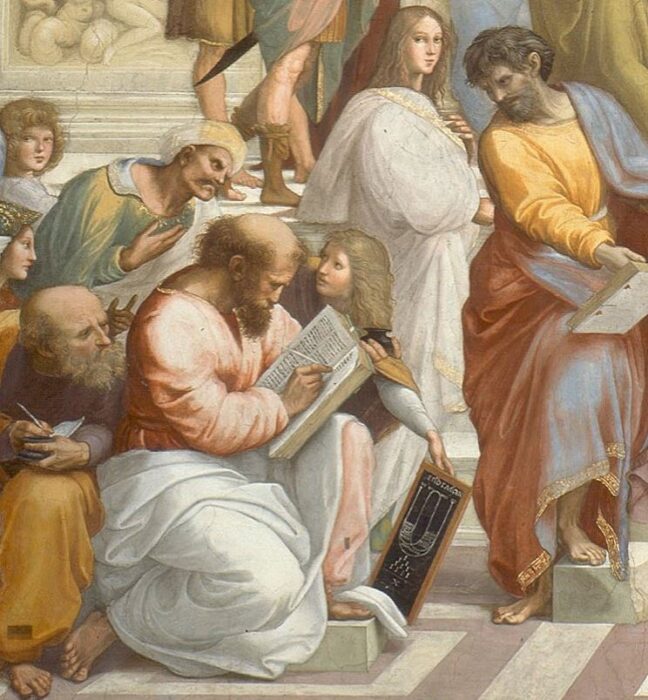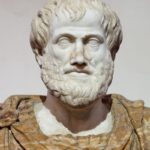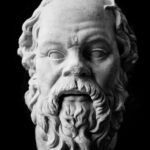Probably the most influential philosopher of all time is Pythagoras. Who was he and what ideas he had about music? This article attempts to sum it up.
Who was Pythagoras?
Pythagoras or Pythagoras of Samos lived between c. 570 BC and c. 495 BC. He was an ancient Greek philosopher, who greatly influenced not only Plato or Aristotle, but Western philosophy itself. He was born on the island of Samos, later moved to Croton in South Italy, where he founded his school.
It is impossible to measure his complete influence on science and philosophy! His interest and impact include ethics, mathematics, metaphysics, mysticism, music theory, politics, religion… and the list goes on!
Pythagoras on music
Pythagoras and the perfect fifth
According to legend one day Pythagoras was walking down the street, where he heard a blacksmith hammering his iron. He found the clanging harmonious and realized that the kind of sound the hammers make is related to the size of the tool.
He discovered that some hammers together made consonance, some dissonance sounds and this was the result of hammers being different in size and weight. Hammer number one was twice the weight of hammer two (ratio 2:1), which is the ratio of an octave (between the two musical pitches the frequency is exactly double). The third and fourth hammer had had the ratio to the first as 4:3 (perfect fourth), and 3:2 (perfect fifth), etc.
This story is probably nothing more than a legend, but it does not mean that it has no scientific base. These proportions are in fact true for string lengths (e.g. in a piano) and helped to create the chromatic scale.
The Pythagorean tuning is based on this 3:2 ratio, also known as pure or perfect fifth. This ratio is one of the most consonant and easiest to tune by human ear.
|Related: Aristotle on music
The music of the spheres
Pythagoras formulated a concept by which he stated that music and harmony is present in the entire Universe. He believed that there are spheres among the celestial bodies, for example between Earth and the Sun. Each object on the sky must produce a noise as it flies by, and these are in perfect tonal harmony. The reason we do not hear this phenomenon is because we hear them from birth.
From Earth to the sphere of the Moon, one tone. From the sphere of the Moon to Mercury, one half-tone. From Mercury to Venus, one-half, from Venus to the Sun, one and one-half tones. From the Sun to Mars one tone, from Mars to Jupiter one-half tone. From Jupiter to Saturn one-half tone, and from Saturn to the fixed stars one-half tone. The summa of these intervals equals the six whole tones of the octave.
This idea not only survived the test of times, but even was further developed by 16th-century astronomer Kepler, and later influenced humanists in the Renaissance era.
Musical medicine
Pythagoras firmly believed that music is not only mathematics and harmony but can be applied as medicine. Among the many musical instruments already available in his time, he preferred the stringed instruments and for some reason rejected the flute and cymbal.
He first observed that certain tunes and rhythms can calm the mind and the soul. Others can invigorate a person. Once he had discovered the basics of this phenomenon, he started to create compositions for certain purposes, sort of recipes. Like a playlist in our modern days.
Songs, he also considered useful in healing and influencing. In his school in Crotona, it was customary to start and end each day with singing. Pythagoreans gathered in a circle with a lead singer in the middle, often accompanied by a musician with a lyre. In the morning they sang songs that helped to wake up and inspire for activities, in the evening those that were relaxing and supported resting.
|Related: Plato on music
Other important teachings of Pythagoras
Metempsychosis, in other words transmigrations of souls. According to Pythagoras each soul is immortal and after death it enters into a new body.
Numerology. Pythagoreans (followers of Pythagoras) believed that mathematics is the source for all things and all things were made of numbers. Number one (monad) for example represented the origins of all things in the universe. The next number, two (dyad), represented matter. Number three was considered special, as it is the smallest number of points to draw a triangle. Triangle was magic for Pythagoras, for many the symbol of Apollo, the god.
Pythagoras was the one devising the tetractys (or tetrad), a triangle with four rows adding up to the prefect number, 10. This became a sacred and divinized symbol for his followers.
Mathematics. Probably not the first to discover, but the famous Pythagorean theorem bears his name. This theorem in geometry states that in a right-angled triangle the square of the hypotenuse is equal [to the sum of] the squares of the two other sides.
Astronomy. Pythagoras was the among the firsts to teach that the Earth was spherical, and he divided it into five climatic zones. He is also credited to be the first to identify the morning and evening star as one object, Venus.
Philosophy. This limited article cannot possibly describe the full impact of Pythagoras on Western Philosophy. We know his school had greatly influenced Plato and Aristotle. In the book A History of Western Philosophy Bertrand Russel concludes, “I do not know of any other man who has been as influential as he was in the school of thought.”









